Kinsman Meaning In The Bible: Family and Redemption
In the Bible, a kinsman is a male relative with important familial and legal duties, particularly embodied in the role of the kinsman-redeemer seen in the Book of Ruth. This figure is responsible for avenging wrongful deaths (Numbers 35:19), redeeming property to preserve family inheritance (Leviticus 25:25), and performing levirate marriage to guarantee the continuity of a deceased relative’s lineage (Deuteronomy 25:5-10).
These roles underscore a divinely mandated commitment to social justice, family stability, and community cohesion within Hebrew society. To grasp the depth of these responsibilities, one can explore further portions of Scripture and cultural practices.
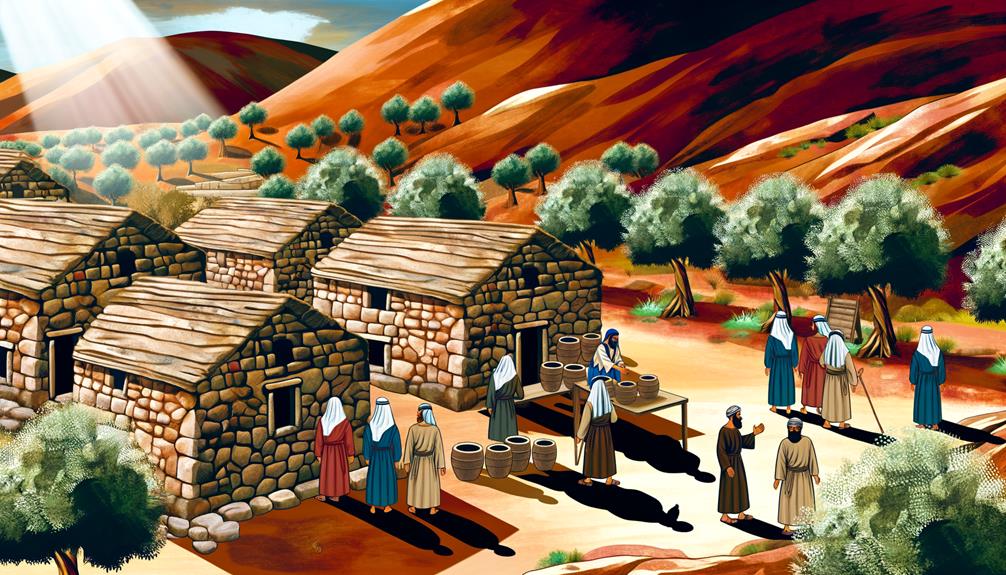
Kinsman Meaning in the Bible: Family, Redemption, and Covenant Duty
| Aspect | Details |
|---|---|
| Term | Kinsman (Hebrew: Goel) |
| Meaning | A close male relative or family redeemer |
| Biblical References | Leviticus 25:25, Ruth 3–4 |
| Key Role | Protect family lineage, redeem property or person, ensure justice |
| Famous Example | Boaz as Ruth’s kinsman-redeemer |
| Spiritual Symbolism | Foreshadowing of Christ as the Redeemer |
| Covenant Significance | Reflects God’s provision, loyalty, and redemptive love |
Definition of Kinsman
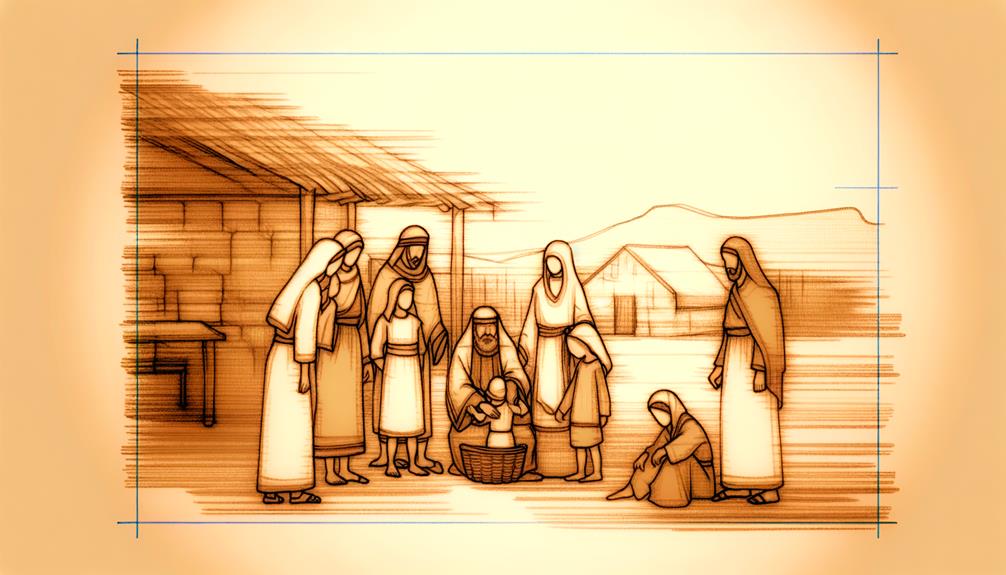
In biblical terminology, a ‘kinsman’ refers to a male relative who plays a significant role within the kinship structure, often carrying specific familial and legal responsibilities as elucidated in various passages of Scripture.
The term is prominently featured in the Book of Ruth, where Boaz acts as a ‘kinsman-redeemer‘ (Ruth 3:9-12), a role that involves protecting the interests of needy family members.
Scripturally, a kinsman can undertake duties such as avenging wrongful deaths (Numbers 35:19), ensuring the continuation of a family line through levirate marriage (Deuteronomy 25:5-10), and redeeming property sold due to poverty (Leviticus 25:25).
These roles underscore the profound interconnectedness and mutual support expected within biblical family systems.
Kinsman in Hebrew Culture
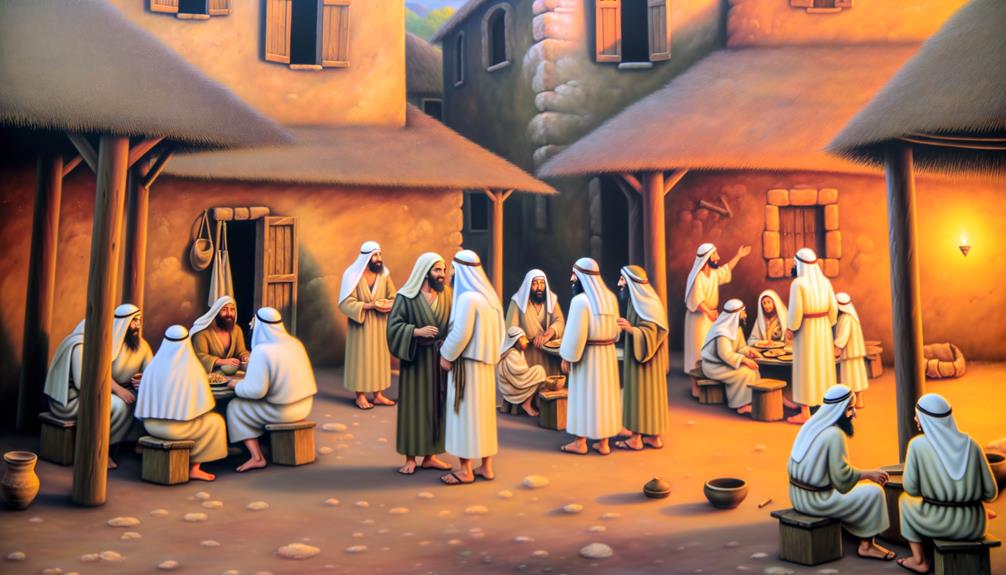
Rooted deeply within Hebrew culture, the concept of a kinsman encompasses not only familial bonds but also specific social and legal obligations that are meticulously outlined in the Torah. This intricate framework reflects the importance of kinship in maintaining community structure and ensuring mutual support.
For instance, Leviticus 25:25 emphasizes the duty of a kinsman to redeem property sold due to poverty, preserving familial inheritance. The Book of Ruth illustrates the concept vividly, where Boaz acts as a kinsman-redeemer.
These scriptural mandates underscore the collective responsibility within Hebrew society, ensuring that kinship ties are honored and upheld. The cultural and religious significance of a kinsman in ancient Israel consequently extends far beyond mere blood relations, integrating both divine and communal imperatives.
The Role of a Kinsman
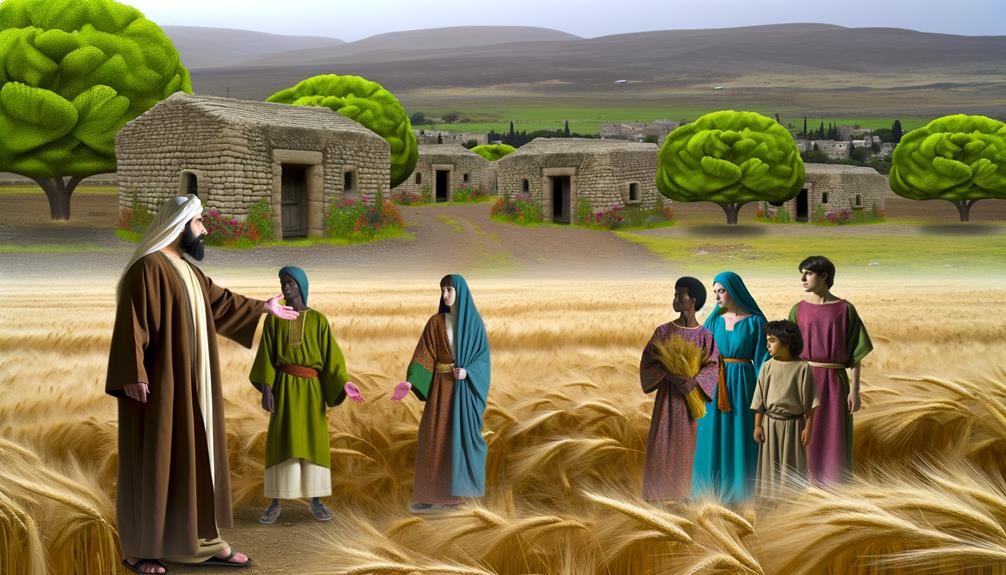
The role of a kinsman in biblical times encompassed a range of familial responsibilities, such as the duty to redeem land or relatives in financial distress, as illustrated in Leviticus 25:25.
This role held significant cultural importance, reinforcing the social and spiritual fabric of the community.
Scriptural narratives like the story of Ruth and Boaz (Ruth 3:9-13) provide profound insights into these obligations and their theological implications.
Biblical Family Responsibilities
Among the manifold responsibilities of a kinsman in biblical times, one of the most significant was the duty to act as a redeemer, as elucidated in Leviticus 25:25 and Ruth 4:4-6.
This entailed redeeming property that a relative had sold due to financial distress, thereby preserving the family’s inheritance within the tribe.
Additionally, the kinsman was tasked with marrying the widow of a deceased relative to guarantee the continuance of the family line, a practice known as levirate marriage (Deuteronomy 25:5-10).
These responsibilities underscored the kinsman’s role in maintaining familial stability and social order, integrating theological principles with societal norms to foster a community grounded in mutual support and divine ordinances.
Cultural Significance Explained
Understanding the cultural significance of a kinsman in ancient Israel necessitates recognizing how these familial roles were interwoven with the legal, social, and religious fabric of the community.
The role of a kinsman, or ‘go’el,’ extended beyond mere familial bond; it included duties such as avenging blood (Numbers 35:19), redeeming property (Leviticus 25:25), and marrying a widow to preserve lineage (Deuteronomy 25:5-10).
These responsibilities guaranteed that family assets and heritage remained intact, reflecting a divine mandate for social justice and community cohesion.
The Book of Ruth illustrates this through Boaz, whose actions as a kinsman-redeemer exemplify the integration of legal obligations with compassionate care, highlighting the profound theological and cultural implications of kinship in Israelite society.
Kinsman in the Story of Ruth
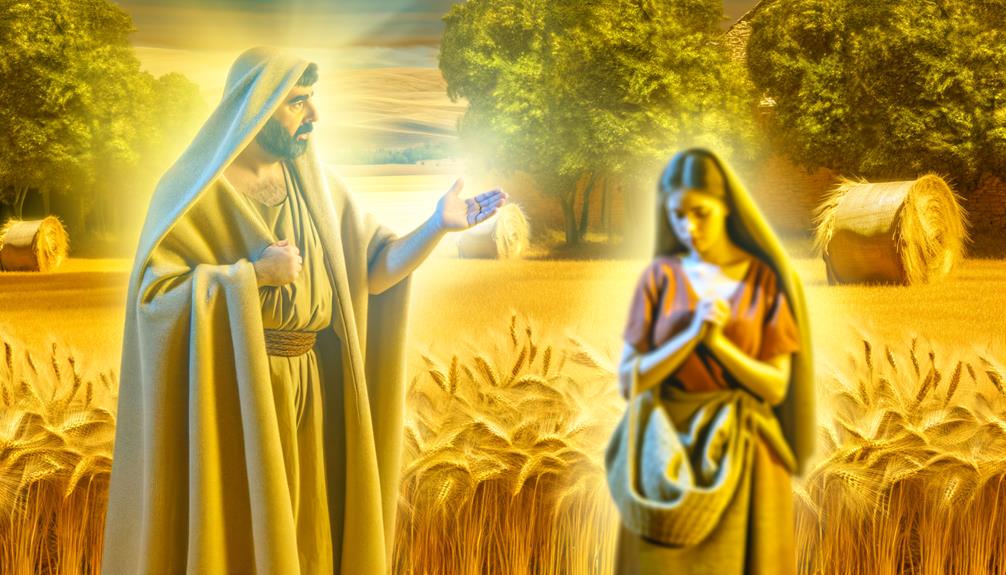
In the narrative of Ruth, the concept of a kinsman-redeemer is pivotal, exemplified through Boaz‘s role in securing Ruth and Naomi’s future as prescribed in Leviticus 25:25 and Deuteronomy 25:5-10.
Boaz, a close relative of Naomi’s deceased husband, fulfills his duty by marrying Ruth, thereby preserving the family lineage and property. This act of redemption is deeply rooted in the ancient Hebrew laws, where a kinsman-redeemer was responsible for protecting the interests of vulnerable family members.
Through Boaz’s actions, the story illustrates the themes of loyalty, providence, and divine orchestration, highlighting the importance of kinship and covenantal faithfulness within the biblical tradition.
Boaz’s role underscores the theological significance of family and community support.
Levitical Laws and Kinsmen
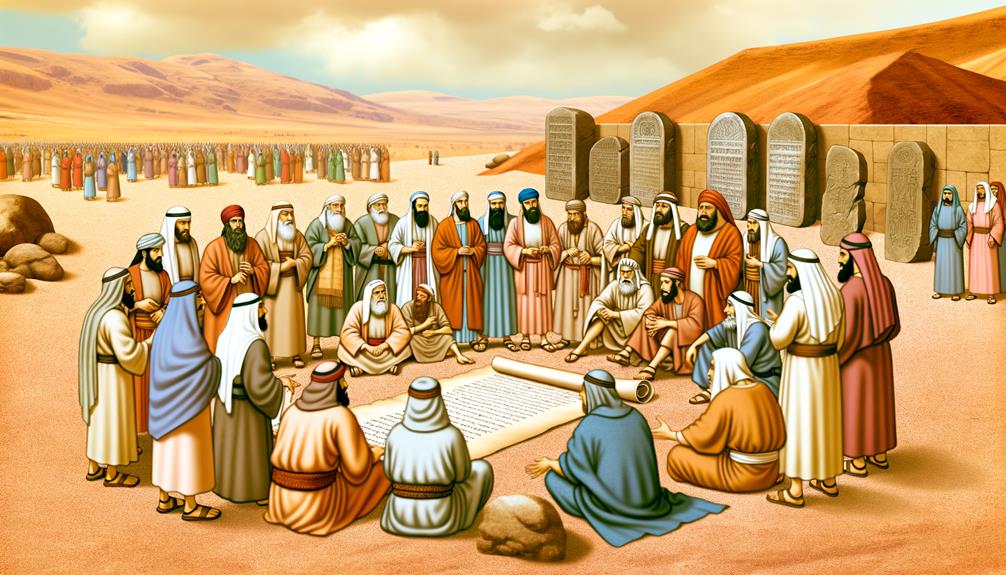
The Levitical laws provided a structured approach to family redemption rights, ensuring that land and inheritance remained within the family, as outlined in Leviticus 25:25-28.
These laws emphasized the importance of the kinsman-redeemer, who was responsible for safeguarding family property and lineage, including fulfilling marital obligations through levirate marriage as prescribed in Deuteronomy 25:5-10.
Understanding these provisions offers critical insights into the societal and theological constructs that governed ancient Israelite kinship and property rights.
Family Redemption Rights
Exploring the concept of family redemption rights within the context of Levitical laws reveals a profound commitment to social justice and familial responsibility as outlined in the Hebrew Scriptures.
The Levitical laws detailed in Leviticus 25:25-28 emphasize the kinsman redeemer’s role in restoring family stability by redeeming property or individuals who have fallen into economic distress. This practice underscores the community’s holistic approach to maintaining social equity and preventing generational poverty.
| Aspect | Scriptural Reference | Purpose |
|---|---|---|
| Redemption of Property | Leviticus 25:25-28 | Prevent loss of familial land |
| Individual Freedom | Leviticus 25:47-49 | Release from servitude |
| Social Justice | Leviticus 25:10 | Year of Jubilee, liberation |
| Familial Duty | Leviticus 25:25 | Upholding family honor and support |
| Economic Stability | Leviticus 25:35-37 | Prohibition of usury among kin |
This theological framework reveals the Hebrew Bible’s intricate design for sustaining societal balance through kinship obligations.
Inheritance and Land Ownership
Building on the principle of social justice and familial responsibility, the Levitical laws also meticulously address inheritance and land ownership to guarantee the preservation of tribal lands within the Israelite community.
According to Leviticus 25:23-28, land was considered a divine gift and therefore could not be permanently sold. Instead, it was to remain within the original family lineage. The kinsman-redeemer (go’el) played a significant role in this process, ensuring land sold due to economic hardship could be redeemed. This law upheld social equity and continuity of the family heritage.
Numbers 36:7-9 further reinforced that inheritance should not transfer between tribes, thereby preserving the distinct tribal identities and ensuring equitable distribution of resources among the Israelites.
Marital Obligations Explained
Frequently observed within the Levitical laws, the concept of the kinsman-redeemer extends beyond property rights to encompass marital obligations, particularly outlined in Deuteronomy 25:5-10.
These laws mandate that if a man dies without leaving a male heir, his brother must marry the widow to produce offspring, ensuring the deceased’s lineage and property remain within the family. This practice underscores the theological significance of family continuity and societal stability in ancient Israel.
| Scriptural Reference | Obligation | Purpose |
|---|---|---|
| Deuteronomy 25:5 | Marry widow | Continue lineage |
| Leviticus 25:25 | Redeem property | Preserve inheritance |
| Ruth 4:5 | Marry Ruth | Secure family name |
This framework reveals the multifaceted role of kinsmen in maintaining familial and societal integrity.
Kinsman Redeemer Concept
Rooted deeply in ancient Israelite culture and law, the concept of the kinsman redeemer (Hebrew: גּוֹאֵל, go’el) is prominently illustrated in the Book of Ruth, where it encompasses themes of familial duty, redemption, and divine provision.
The go’el’s role, as outlined in Leviticus 25:25 and Deuteronomy 25:5-10, includes redeeming a relative’s land, marrying a deceased kinsman’s widow to preserve the family line, and ensuring justice within the clan.
Boaz, as Ruth’s kinsman redeemer, exemplifies this by marrying Ruth and securing her and Naomi’s future, reflecting God’s covenantal faithfulness.
This concept underscores the importance of kinship and God’s providential care, anchoring Israelite social structures in theological and moral imperatives.
Kinsman in the New Testament
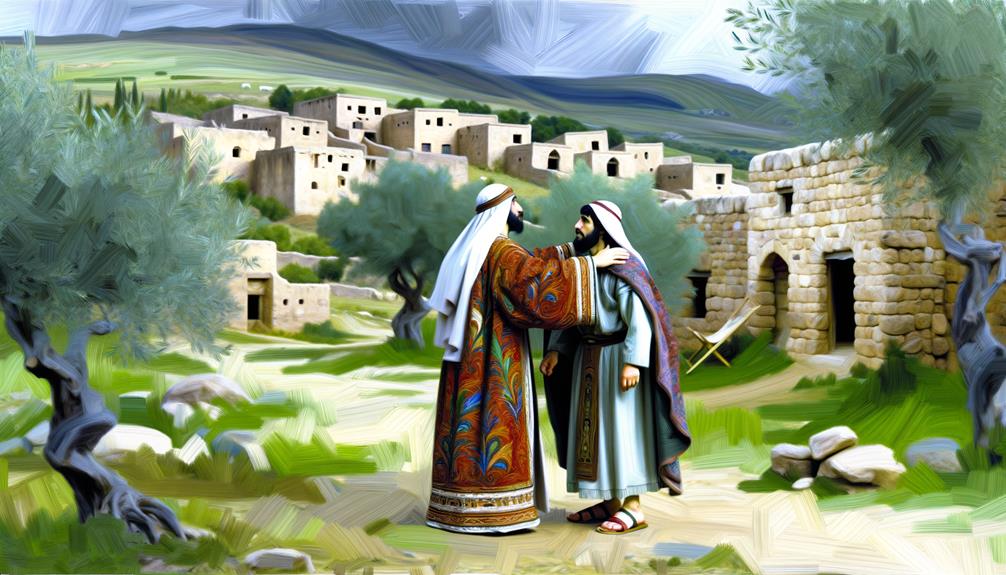
The New Covenant expands the concept of kinsman through the lens of spiritual kinship, where believers in Christ are considered part of God’s family, as illustrated in passages such as Romans 8:14-17 and Ephesians 2:19.
Historically, the notion of kinship was rooted in blood ties and tribal affiliations. However, the New Agreement redefines kinship by emphasizing faith in Christ as the unifying factor.
Romans 8:14-17 speaks of believers as ‘children of God‘ and ‘heirs with Christ,’ while Ephesians 2:19 describes them as ‘fellow citizens with the saints and members of the household of God.’
This shift reflects a theological change from ethnic and national identity to a spiritual family bonded by faith.
Spiritual Implications of Kinsman

Understanding the spiritual implications of kinsman in biblical theology requires examining how the concept of kinship transcends physical lineage to embody a profound relationship with God through faith in Jesus Christ.
The New Scripture expands the traditional Jewish understanding of kinship to include all believers as part of God’s family. Paul writes in Galatians 3:26-29 that, through faith in Christ, believers become ‘sons of God’ and heirs according to the promise.
This spiritual kinship emphasizes:
- Unity in Christ: All believers are one in Jesus, erasing divisions.
- Inheritance of God’s promises: Spiritual heirs of Abraham’s blessings.
- Adoption into God’s family: Becoming children of God through faith.
This theological perspective redefines kinship, focusing on faith over bloodline.
Conclusion
The concept of a kinsman in biblical texts, from Hebrew traditions to the New Covenant, embodies significant roles, from familial protector to the profound kinsman redeemer.
This figure, exemplified in the story of Ruth and embedded within Levitical laws, underscores divine justice and mercy.
Such themes foreshadow Christ’s redemptive work, serving as an allegory for salvation.
Consequently, understanding the kinsman enriches theological insights and offers a deeper appreciation for sacred narratives and divine providence.






